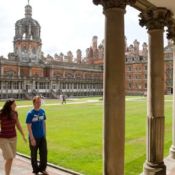

Moving to London
Dreaming about this one stage in my life for the past few years and having it come to fruition as I arrived in London, this was a new beginning and chapter of my life. I know, it sounds pretty climatic and it was (I’d like to think so). While saying goodbyes to my family and friends was difficult, the biggest challenge in moving countries was surprisingly not obtaining the visa or the first few days at university – it was about my outlook on this new move. Personally, moving to London was more than just an educational decision, I wanted to study abroad for the memories and new experiences that it would entail. As such, I learned that you have to be genuinely excited and open for this new change!
As a Canadian, obtaining my visa was a fairly simple process. From applying through the government website and paying the fees (less than 30 minutes) to attending my interview appointment (appointment lasted around 30-40 minutes), the last thing left to do was to wait for the notification that my passport was being mailed back to me. As I received a late acceptance, I had to apply for my visa later than I had originally planned. The extended timeline in applying for my visa led to me having to pay an additional fee for faster processing time of the visa itself. I highly recommend that students (unlike me) apply for their visa the moment they are able (ask your advisor!).
Upon arrival, the commute from the airport to the hotel was seamless since I had booked a taxi to secure a method of transportation – I had two large suitcases and two carry-on luggage. Given the amount of luggage I had and the fact that my flight was delayed twice, taking a bus or train would not have been an option.
At last, I made it to Hogwarts to study in a 3 year LLB program! Jokes aside, Royal Holloway has been known to be to one of the most beautiful campuses in the UK and there is no contesting that. The first few days consisted of setting up my bank account and going back and forth to potential private accommodations around the university campus area. Once I secured a room, I gave myself a few days to do touristy things (eat lots of food at local markets) and buy the essentials for my bedroom and the kitchen. I do recommend that students arriving the next Autumn to frequently check Spare Room and or Rightmove to have an idea of what rent would look like and whether or not it would make more sense to live in the school provided accommodations.
Although this is the beginning to my experience in the UK, I am grateful for the continuing support that I received from my advisors at Across The Pond. As a result of their guidance and resources, I did not once feel worried, nervous, or anxious about the application process. The entire process was as seamless as it could have been. My parting message of this blog to future students – no matter how many checklists you may create, you will not 100% prepared for moving to another country but that is OK!
- Puneet

Student Life and Opportunities at Royal Holloway University of London
What I didn't quite realise before starting university was the vastness of extracurricular activities I would encounter. University is truly like its own little world with such a range of societies, events and things to take part of that everyone is able to find something fun to do outside of academics. Here is a little breakdown of my experience of student life at RHUL, and what I have personally chosen to take part of.
Student Life
RHUL is located in Egham, which is a smaller town in Surrey with only a 40 minute SWR trainride to London. People have very mixed opinions about Egham, because it is really a small town, but personally I really like it. It’s pretty quiet with lots of greenery around, but still very close to the hustle and bustle of London whenever you want to go shopping, go to museums, go out for dinner, etc. Besides, Egham truly has everything you need in your day to day life; grocery stores, cozy cafés, gyms, some thrift stores, Boots, etc. Egham is also close to Windsor, just 20 minutes away by bus. Apart from the famous Windsor Castle, there are some really nice thrift stores, pubs and restaurants.
As far as night life goes, the clubs that are in Egham are the ones on campus. Again, students have mixed opinions on the SU club, but I have had lots of fun there. They have many different fun themed club nights, some of my favourites from last year being Abba night and Chappell Roan and Charlie XCX. If you want to explore other clubs, there are great ones in Ascot, Windsor and obviously London.
Nordic Society
When attending Fresher’s Fair in my first week of uni, I was connected with people from the Nordic Society. The two girls who were there were very sweet and welcoming and encouraged me and my friend to come to the taster session and see if we wanted to join, which we did! Throughout the year, I attended bar socials, gingerbread baking, group study sessions and club nights with Nordic Society. I always had a great time with very nice people, so much so that I myself wanted to be part of the committee in my second year.
I was elected Secretary for the society and have already gotten started, together with the rest of the committee, to prepare for the year ahead. There is much more that goes into planning events than you would think when you are just a member attending, but I think it’s going to be very fun. I love that Nordic Society provides a home away from home for Nordic Students, and is just a warm and welcoming place to make friends and have fun!
Being part of societies and sports clubs is a great way to make a new, big place like university feel smaller and more welcoming to you. It’s a good way to make friends and just do more fun activities. Furthermore, taking on a committee role, apart from being a nice way to give back to a society you have had fun within, gives lots of transferable skills like teamworking, communication, planning, delegating, etc.
Academic Representation
Next year, I have chosen to become an academic rep for the Languages, Literatures, and Culture Department. At RHUL, the levels of Representation work like this:
-
Course Reps voice feedback on course structure, resources, feedback timing, timetabling, and more.
-
Senior Course Reps support Course Reps, co-chair departmental meetings, and collaborate directly with academic staff.
-
School Reps connect with VP Education and represent students at high-level forums like School Boards and Education Committees.
-
At the top, the VP Education is elected SU leader responsible for academic quality and representation University-wide.
Course rep is a voluntary role that builds leadership, communication, and negotiation skills, and reps drive tangible change. For instance, in Economics, Course Reps influenced feedback delivery, exam support, equity in workload, and even Bloomberg training.
I am very happy about stepping into this role in my second year. I attended a two day training conference where I got to attend interesting sessions about academic representation. I believe this will be a great opportunity to be more involved in the department I’m part of, to hone skills which will be great for future jobs, and to meet new people!
- Molly

Applying to a UK University
Applying to a university in the UK – in my case, Royal Holloway, University of London (RHUL) – was an exciting, but at times rather complicated, process. As a Swedish student who completed the International Baccalaureate (IB) in high school, I had certain advantages, but there were also several steps that weren’t always entirely straightforward.
For me, it all started with choosing which course I wanted to study. I chose to study in England primarily because of the subject I wanted to pursue. I wanted to study literature, and preferably Comparative Literature, which is relatively rare and mainly offered in the UK. I did a lot of research and picked a few universities offering English Literature and a few offering Comparative Literature. RHUL became my top choice, as its location was great and the course structure looked the most interesting.
I submitted my application through UCAS, which is the central application system for UK universities. As an IB student, I had to submit my predicted grades, and later send my final IB results directly to the universities. The application process also takes place during the winter, with the deadline in January—which, unfortunately for me, happened to be a particularly stressful time in school, as all my coursework was due. It was a bit of a hassle to ensure that everything was submitted correctly and on time, especially since IB results are released in July and the semester starts in September. Luckily, I had already received a conditional offer from RHUL, which became an unconditional acceptance once my final grades were released.
One of the biggest challenges was figuring out CSN (the Swedish student finance system) and how to fund my studies. Since UK universities have tuition fees—something we’re not used to in Sweden—I had to apply for both student grants and a tuition fee loan. The CSN process can be quite bureaucratic, and it took a while to get everything approved. You have to submit your acceptance letter, course details, and sometimes additional documents, which requires a bit of patience. My final university offer came fairly late, which meant I couldn’t apply for CSN until August. Because of that, it took a long time for my application to be approved and for me to receive my funds, which was stressful—especially since there wasn’t much I could do but wait.
What truly made the process easier for me was the support I received from Across the Pond. My contact person there was incredibly helpful. She guided me through the entire application process, answered all of my questions—big and small—and helped me with the UCAS application, CSN documents, and understanding all the important deadlines. That kind of support is a lifesaver when taking on something as big as applying to university abroad—especially since, for example, your parents often know just as little about the process as you do. I was lucky to have parents who were willing to learn about the system, and teachers at my high school who were very supportive. But having my contact person at Across the Pond was something else entirely. When everything felt confusing, it was such a relief to have someone who understood the system and could explain every step. Thanks to her, I felt confident in my choices and managed to complete everything on time.
Applying to a UK university as a Swedish student is absolutely possible, but it does take some extra effort and planning—especially when it comes to CSN and various documentation. But with the right support, like I got from Across the Pond, the process becomes much more manageable. In the end, it was truly worth all the effort—I’m really happy at RHUL and so glad I took the leap!
- Molly

University life outside a big city
When I first decided to study in London, I pictured myself living for the first time in a major international city. I couldn’t wait to be surrounded by historical monuments, take the tube around the city, and experience London nightlife. However, my university journey didn’t quite go as planned. After thinking through all my options for studying in the UK, I decided to attend Royal Holloway University of London – which isn’t actually in the city, but in a town called Egham about a 40 minute train ride away. I was drawn to the tree-filled campus and small-town feel, but I worried I’d regret turning down the opportunity to live in a big city.
As it turns out, Egham was the perfect place for me. I had never lived in a city before, and while I was already making the transition to living abroad, learning to live in a whole new environment would have only made things harder. The town was walkable and easy to navigate, so I felt completely comfortable after my first few weeks. All the students I met lived in a similar area – no long train rides to go visit my friends! Everybody was a short walk away, which made socialising and settling in much easier.
The highlight of Royal Holloway’s location was its beautiful campus. The iconic Founders’ Building is famous for a reason, but there’s lots more to appreciate around the uni. For someone like me who loves the outdoors, I appreciated being able to walk through the woodlands on my way to lectures, or have a picnic in a grassy field with my friends. Some of my fondest memories were made at the nearby Virginia Water park, which features a huge lake, a peaceful waterfall, and miles of trails to explore.
Admittedly, there were times I wished I lived in London. I sometimes felt jealous of international students who studied in the city, enjoying the nightlife and making the most of London’s job opportunities. But in the end, I felt secure in my choice. Once I found a great group of friends, I had plenty to do in Egham. In terms of jobs, a smaller town means less competition for highly-coveted student roles – I had an on-campus job for two years, and did a remote internship. If anything, I feel that living in a smaller town allowed me to better immerse myself in British culture. Living in London can sometimes lead to always feeling like a tourist, but in Egham, I truly felt like a member of the community. And the best part? London was always a short train journey away!
There’s no denying the allure of London, and it’s a great fit for a lot of people, but I want to encourage international students to consider other locations in the UK. City life isn’t for everyone, and a campus university can provide a tight-knit community with a wealth of resources. Do your research, and consider what kind of environment you would thrive in as a student. Maybe it’ll be a bustling city, or maybe it’ll be a quiet town!
- Sophie

Wonderful moments, new friends, achievements and growth
Growing up in an international school for the majority of my life meant that I was always aware I was going to be moving away for university. My friends were all planning to attend universities all around the world from Tokyo to Toronto, and I was no different. While England had always been on my mind as an option, it was after a week-long trip I took for my theatre class in my final year of high school that I knew I had to be near London. After a week of theatre workshops and walking through those busy streets filled with glowing West End shows, my heart was set. And then I came across a university less than an hour away that offered a course in Drama and Creative Writing, and I knew that was where I needed to be.
Even through a website screen, Royal Holloway looked gorgeous. It was a cosy campus university in a lush green forest, close enough to London for many a day trip and with a thriving student community with endless things to get involved in, and I couldn’t have been more excited. My dad and I drove up to campus all the way from Germany, and it wasn’t until we had pulled up the hill and I saw our gorgeous Founders building for the first time that everything actually felt real. I still remember that first day moving in as if it was yesterday - the endless boxes, the unfamiliar campus, hugging my dad tightly knowing that I was by myself for the very first time.
Since that day I’ve now done two years of university, and it’s been one of the best decisions I’ve made. My course has given me the opportunities to explore my passions in a variety of different ways - learning more about the theory and getting to practice my playwriting and fiction writing skills through the creative writing side, and getting to collaborate on original performances like plays and musicals, as well as getting to direct on the theatre side. Both of my cohorts are very small, with classes that are mainly held in a workshop and seminar format, which means I get to know all of my classmates and my professors very well. There are also no exams, just a lot of coursework, assignments and performances, which means far less stress studying and an easier workload to manage.
Through university I’ve also gotten to take part in many incredibly exciting extracurriculars and societies, like getting to do publicity and social media for shows and for committees, getting to write and direct my own pieces through scratch theatre nights, choreographing and performing in different dances, performing in original productions and student films and even getting to go to the Edinburgh fringe. There are endless possibilities when it comes to societies and groups to get involved in, and it’s such a great way of making friends and going outside of your comfort zone.
Another great thing about studying abroad was getting to see and explore more of England. I’ve been lucky enough to take quite a few trips to London and see some amazing shows, museums and simply wander around, and to see the gorgeous views of Windsor and Oxford and Brighton all within a short train journey. Egham itself is also very cosy, with the gorgeous Virginia Water park close by.
Everyone says that time in university passes quickly, and looking back I wish that 18 year old had believed that a little more. My first two years at university passed in what feels like a flash, filled with many wonderful moments, new friends and achievements and growth. I’ve gotten so many amazing opportunities throughout my time here, developed as a creative and as a person, and most importantly I’ve gotten to meet many amazing people who are now some of my absolute best friends, and whom I couldn’t be more grateful for.
As I’m sitting back in my childhood bedroom home for the summer, I can’t wait for my third year to begin. So for anyone wondering or considering taking that leap of faith and going off to study in England - I say absolutely do it. It’s one of the best decisions I could’ve made, and every time I sit on my campus on a sunny day I still can’t quite believe it’s real.
- Anastasia




